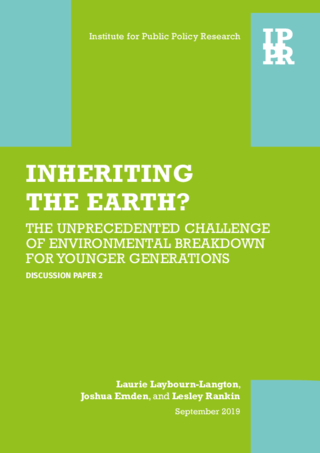Younger generations to bear burden of climate breakdown
Posted on 03 Oct 2019 Categories: Climate crisis, News, Wellbeing
 The Institute for Public Policy Research has published Inheriting the Earth? The unprecedented challenge of environmental breakdown for younger generations, the second discussion paper in a series that ‘seeks to inform debate over the relationship between policy and politics and environmental breakdown’. The paper explores ‘the unprecedented challenge imposed by environmental breakdown on younger and future generations – both those who do not currently have significant decision-making power in society and those yet to be born’.
The Institute for Public Policy Research has published Inheriting the Earth? The unprecedented challenge of environmental breakdown for younger generations, the second discussion paper in a series that ‘seeks to inform debate over the relationship between policy and politics and environmental breakdown’. The paper explores ‘the unprecedented challenge imposed by environmental breakdown on younger and future generations – both those who do not currently have significant decision-making power in society and those yet to be born’.
The paper argues that
‘younger generations will disproportionately bear the burden of having to rapidly transform economic systems in order to decelerate environmental degradation while withstanding its increasingly destabilising consequences’.
It states that the climate crisis will fall hardest on those who are least responsible for it, while imposing severe constraints on the way that future generations live their lives. Millennial leaders will need to continue to slow environmental breakdown and build a sustainable economic model that will allow for society to ‘live within environmental limits while improving quality of life’. They will need to manage destabilised human systems responding to issues such as rising food prices and potentially give aid to economic systems facing collapse. Regressive political movements exploit and thrive off fear and destabilisation. Future leaders will need to counter these while providing emotional stewardship to societies experiencing the ‘psychological and cultural effects of rapid transformations and the growing severity and frequency of environmental shocks’.
The paper argues that ‘two overall responses are required to ameliorate this injustice’: the empowerment of young generations and accelerated investment and support to help ‘future generations realise a more sustainable, just and prepared world’. It recognises that there has been some progress on these fronts, acknowledging the success of the school climate strikes led by Greta Thunberg, and policies such as the Well-being of Future Generations (Wales) Act 2015 that serve to protect the interests of future generations. However, it notes that ‘overall, efforts to support younger and future generations are dangerously inadequate’.
The paper sets out a series of measures to ‘empower and support younger and future generations to respond to and prepare for environmental breakdown’. First, it recommends that the UK government builds on the example of Wales and ‘adopts a UK-wide Future Generations Act in order to formally recognise protections for the interests of future generations and their right to a stable environment’. It also advocates extending the vote to 16 and 17 year olds, arguing that the ‘unprecedented implications and challenges of environmental breakdown for younger generations mean exclusion of capable younger people is no longer acceptable’. Finally, it recommends lowering the discount rate, ‘a financial tool that affects the attractiveness of different projects in which governments and businesses consider investment’.
It concludes:
‘Young people are becoming leaders in their own right, bravely facing up to the realities of environmental breakdown and urging a faster response. Current leaders must take heed and act now to minimise the toxic inheritance they bequeath to these generations.’
Read the full paper here.
Read the first discussion paper in the series, Facing the crisis: Rethinking economics for the age of environmental breakdown.
Posted on 03 Oct 2019 Categories: Climate crisis, News, Wellbeing
